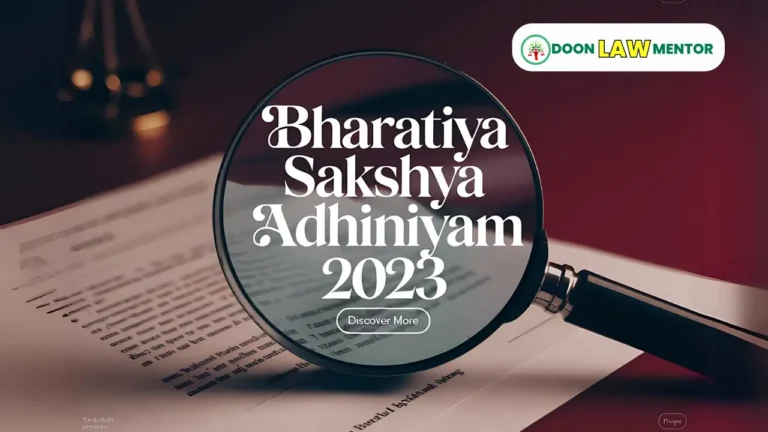What powers the Election Commission of India? Doon Law Mentor provides an in-depth guide for law students, dissecting Article 324, legal frameworks like BNS and BNSS, and the ECI’s role in fair elections. Explore its autonomy, challenges, and constitutional significance.
Table of Contents
Introduction
Imagine a massive democracy with over 90 crore voters, where every vote counts fairly, no matter where it’s cast. The Election Commission of India (ECI) makes this possible, acting as the heart of India’s electoral system. For fresh law students and new lawyers, understanding the Election Commission of India is like learning how India protects its democracy. Established in 1950 under Article 324, the ECI ensures free and fair elections for Parliament, state legislatures, and the President and Vice-President. This ultra-detailed article, created by Doon Law Mentor, explores the Election Commission of India as of July 15, 2025, covering its constitutional roots, legal powers, key functions, challenges, and why it’s crucial for your legal studies. Using simple language, we’ll dive into its history, legal framework, and impact, keeping the focus on constitutional and legal perspectives.
Background and Context
The Election Commission of India was born on January 25, 1950, under Article 324 of the Indian Constitution, just before India became a republic. With 96.88 crore voters in 2025, India is the world’s largest democracy, making the ECI’s role monumental. The Election Commission of India oversees elections to the Lok Sabha (543 seats), Rajya Sabha (245 seats), 28 state assemblies, 8 union territory legislatures, and the offices of the President and Vice-President. It does not manage local body elections, which State Election Commissions handle under Article 243K.
After India’s independence in 1947, the Constituent Assembly, led by Dr. B.R. Ambedkar, designed the ECI to shield elections from political interference. During debates, Ambedkar stressed that election machinery must stay independent, free from executive or legislative control, to ensure democratic integrity. The Election Commission of India proved its mettle in the 1977 post-Emergency elections, resisting government pressure to conduct fair polls, earning public trust. By 2025, the ECI manages 10.5 lakh polling stations, 1.85 crore first-time voters, and innovations like Electronic Voting Machines (EVMs) and Voter-Verifiable Paper Audit Trail (VVPAT) systems, cementing its global reputation.
Constitutional Inspiration
The Election Commission of India draws its authority from Part XV (Articles 324–329) of the Constitution, reflecting the framers’ vision of an autonomous electoral guardian. Article 324, the cornerstone, gives the ECI “superintendence, direction, and control” over elections, a broad mandate inspired by the need to preserve democracy. Like Lord Vishnu in Hindu mythology, who protects the universe, the Election Commission of India safeguards India’s electoral process. Cases like T.N. Seshan v. Union of India (1995) clarified that Article 324’s plenary powers allow the ECI to act decisively, even without explicit laws, to ensure fairness. This constitutional design ensures the Election Commission of India remains independent, a principle reinforced by the Supreme Court’s 2023 Anoop Baranwal ruling.
Read More: Mastering State-Specific Law Questions in Judiciary Interview 2025
Key Functions and Powers of the Election Commission of India
The Election Commission of India has a vast mandate, detailed below:
- Election Management: Conducts national and state elections, setting dates, overseeing polling, and declaring results. In 2024, the Lok Sabha elections spanned 44 days across 7 phases.
- Electoral Rolls: Prepares and revises voter lists under the Representation of the People Act, 1950 (RPA), issuing Electors Photo Identity Cards (EPICs) since 1993. In 2025, 1.85 crore new voters were added.
- Model Code of Conduct (MCC): Enforces ethical campaigning since 1971, banning hate speech and vote-buying, though it’s non-statutory. Violations led to 4,657 notices in 2024.
- Party and Symbol Allocation: Recognizes national and state parties under the Election Symbols Order, 1968, resolving disputes like the Shiv Sena split in 2023.
- Quasi-Judicial Role: Advises on disqualifications (e.g., convicted candidates) under Article 103, with binding opinions to the President or Governors.
- Technology Integration: Introduced EVMs in 1982 and VVPATs in 2013, ensuring transparency. In 2025, 100% VVPAT verification was piloted in 5 constituencies.
The Election Commission of India employs 300 officials at its Delhi headquarters and coordinates with state election officers.
Core Legal Issues Requiring the Election Commission of India
The Election Commission of India tackles critical legal challenges:
- Electoral Fraud: Preventing booth capturing, vote-buying, or impersonation, addressed by BNS Section (bribery, up to 1 year) and BNSS for arrests.
- Independence vs. Accountability: Balancing Article 324’s autonomy with transparency, as extra-legal tools like “nudges” raise concerns.
- Executive Influence: Appointment processes risk government control, addressed by Anoop Baranwal (2023).
- Corrupt Practices: Tackling hate speech (, up to 3 years) and misinformation, especially during campaigns.
- Voter Inclusion: Ensuring marginalized groups vote, with 1.85 crore new voters added in 2025.
- Technological Challenges: Addressing EVM tampering allegations, countered by VVPAT and audits.
These issues underscore the ECI’s role in protecting democracy.
read More: Top 10 Judiciary Exam Myths Every Aspirant Should Ignore: A Guide to Success
Support from Legal and Political Bodies
The Election Commission of India is backed by:
- Supreme Court: Upheld ECI’s powers in T.N. Seshan (1995) and reformed appointments in Anoop Baranwal (2023), adding the CJI to the selection committee.
- Parliament: The RPA, 1951, provides statutory backing, while the Chief Election Commissioner Act, 2023, ensures neutral appointments.
- Political Parties: Agree to MCC guidelines, with 6 national and 59 state parties recognized in 2025.
- Civil Society: NGOs like Pratham and ASER (2023 report) laud ECI’s voter education drives.
- Media: Outlets like The Hindu praise ECI’s transparency but urge faster dispute resolution.
This support bolsters the Election Commission of India’s authority.
Legal Framework and Actions Taken
The Election Commission of India operates under:
- Article 324: Grants plenary powers for election oversight, upheld in Mohinder Singh Gill v. Chief Election Commissioner (1978).
- RPA, 1951: Regulates voter registration (Section 16), candidate eligibility (Section 29), and offenses (Section 125).
- BNS, 2023: Punishes electoral crimes:
- Section 170: Bribery (up to 1 year).
- BNSS, 2023: Empowers arrests and investigations for electoral violations.
- Election Symbols Order, 1968: Allows ECI to suspend parties for MCC breaches.
- Chief Election Commissioner Act, 2023: Mandates a committee (PM, Opposition Leader, CJI) for ECI appointments.
Actions include:
- Voter List Updates: Annual revisions, with 2025 adding 1.85 crore voters.
- EVM and VVPAT: Full VVPAT use since 2019, with 5% slip verification.
- Disqualifications: 12 MPs disqualified in 2024 for false expense reports.
- MCC Enforcement: 4,657 notices issued in 2024, with 23 candidates barred.
Social Impact and Challenges
The Election Commission of India shapes society by:
- Strengthening Democracy: Post-1977 elections restored trust after the Emergency.
- Empowering Voters: EPICs and drives included 2.1 crore differently-abled voters in 2024.
- Promoting Transparency: VVPATs and expenditure limits (₹95 lakh per Lok Sabha candidate) curb fraud.
Challenges include:
- Executive Influence: The 2023 Act allows government sway, criticized by Justice M.B. Lokur.
- MCC Limitations: Non-statutory status delays enforcement, with courts handling violations.
- Logistical Scale: Managing 10.5 lakh polling stations is complex.
- Misinformation: Social media campaigns challenge ECI’s monitoring,
- Delayed Justice: Election petitions take years, as per the Law Commission’s 255th Report.
Comparison with Similar Institutions
- India (State Election Commissions): SECs under Article 243K handle local elections with less autonomy than the Election Commission of India.
- United States (FEC): Focuses on campaign finance, not voter rolls or polling, unlike the ECI’s broad role.
- South Africa (IEC): Similar election management but uses judicial oversight for disputes, unlike the ECI’s quasi-judicial powers.
The Election Commission of India’s Article 324 powers make it unique globally.
Why the Election Commission of India is Legally and Constitutionally Correct
The Election Commission of India is constitutionally robust:
- Article 324: Grants plenary powers, upheld in Mohinder Singh Gill (1978).
- Judicial Backing: Anoop Baranwal (2023) ensures neutral appointments.
- RPA and BNS: Provide clear tools for electoral integrity.
- MCC Consensus: Party agreement ensures ethical campaigns.
- Ambedkar’s Vision: The ECI’s independence aligns with constitutional intent, protecting democracy.
Criticism of the Election Commission of India
The Election Commission of India faces scrutiny:
- Appointment Bias: The 2023 Act allows executive influence, risking impartiality.
- MCC Weakness: Non-statutory status limits enforcement, as courts delay action.
- Transparency Gaps: Extra-legal “nudges” lack accountability, per X posts (@LegalEagle, July 2025).
- Slow Justice: Election petitions take 2–5 years, per the Law Commission.
- EVM Doubts: Tampering allegations persist despite VVPAT audits.
Case Studies Supporting the Election Commission of India
- Mohinder Singh Gill v. Chief Election Commissioner (1978):
- Context: Upheld ECI’s power to cancel polls for fairness.
- Link: Affirms Election Commission of India’s Article 324 authority.
- Lesson: ECI can act decisively for electoral integrity.
- Anoop Baranwal v. Union of India (2023):
- Context: Reformed ECI appointments, adding CJI to the committee.
- Link: Strengthens Election Commission of India’s independence.
- Lesson: Judicial oversight ensures neutrality.
- 1977 Post-Emergency Election:
- Context: ECI conducted fair polls despite political pressure.
- Link: Proves Election Commission of India’s resilience.
- Lesson: ECI upholds democracy under stress.
Comparative Analysis: Global Perspectives
- United States: The FEC regulates campaign finance, not voter rolls, unlike the Election Commission of India’s comprehensive role.
- South Africa: The IEC ensures fair elections but relies on courts for disputes, unlike the ECI’s quasi-judicial powers.
- United Kingdom: The Electoral Commission lacks the ECI’s plenary powers, operating under strict statutes.
Implications for Lawyers and Law Students
The Election Commission of India offers critical lessons:
- Master Constitutional Law: Study Article 324 and RPA for electoral cases.
- Apply BNS and BNSS: Use BNS Section 170 for bribery cases.
- Defend ECI Autonomy: Cite Anoop Baranwal to uphold independence.
- Push MCC Reforms: Advocate statutory backing for faster enforcement.
- Propose Tribunals: Suggest faster election dispute resolution, per Law Commission recommendations.
Table: Legal Framework of the Election Commission of India
| Law | Key Rule | Role in Election Commission of India |
|---|---|---|
| Article 324 | Superintendence of elections | Grants ECI plenary powers |
| RPA, 1951 | Regulates voter lists, candidates | Ensures electoral processes |
| BNS Section 171B | Bribery (1 year) | Punishes vote-buying |
| BNSS | Arrests and investigations | Enforces electoral laws |
| Chief Election Commissioner Act, 2023 | Neutral appointments | Protects ECI independence |
This table, by Doon Law Mentor, outlines the legal foundation of the Election Commission of India.
Conclusion & Legal Analysis
The Election Commission of India, rooted in Article 324, is the cornerstone of India’s democracy, managing elections for 96.88 crore voters with tools like EVMs and VVPATs. Backed by the RPA, BNS, and BNSS, it ensures fairness, as seen in Anoop Baranwal (2023). Challenges like executive influence and slow justice demand reforms, such as statutory MCC and faster tribunals. The Election Commission of India’s independence, proven post-1977 Emergency, makes it a global model. For law students, it’s a masterclass in constitutional law and democratic governance. Visit Doon Law Mentor at doonlawmentor.com to dive deeper into the Election Commission of India!
Key Takeaways:
- The Election Commission of India ensures fair elections under Article 324.
- BNS Section 171B and BNSS tackle electoral offenses.
- The 2023 Act strengthens ECI’s independence via neutral appointments.
- Challenges include MCC enforcement and delayed disputes.
- The ECI sets a global standard for electoral integrity.
FAQs
What is the Election Commission of India?
The Election Commission of India is a constitutional body under Article 324, overseeing national and state elections.
What are the ECI’s powers?
The Election Commission of India manages voter lists, enforces MCC, and resolves disputes.
Is the ECI independent?
Yes, Article 324 and the 2023 Act ensure the Election Commission of India’s autonomy.
What laws address electoral crimes?
BNS Section 17o and BNSS punish bribery and fraud, supporting the Election Commission of India.
Why study the ECI?
The Election Commission of India teaches constitutional law and democratic principles for legal practice.
#ElectionCommissionIndia #Article324 #IndianDemocracy #DoonLawMentor









